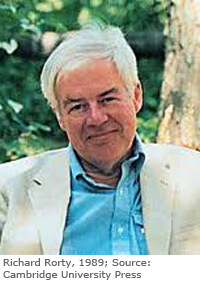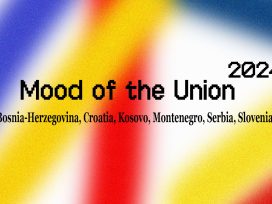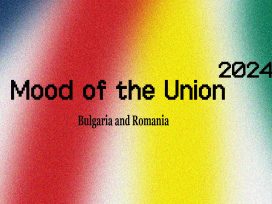During the last two decades of his life, Richard Rorty turned away from philosophy to develop a provocative defence of the novel as “the characteristic genre of democracy, the genre most closely associated with the struggle for freedom and equality”. While not alone in looking to the resources of the novel – Martha Nussbaum, Judith Butler and others have made similar moves, constituting a “literary turn” in ethical and political thought – Rorty’s attention to the particularly democratic nature of the novel’s power is distinctive. Briefly stated, for Rorty the novel “attempts to put us in relations to persons which are not mediated by questions of truth”. The value of Rorty’s conception of the power of the novel, I argue, resides in the epistemological egalitarianism it embodies and its orientation toward social change. What makes the power of novel democratic for Rorty is that it is consistent with rejecting “the idea that anything could have authority over the members of a democratic community save the free, collective decisions of that community”.
Rorty’s turn to the novel
The context of Rorty’s embrace of the novel within the development of his own thought is instructive for understanding his view of the distinctive power of this genre over others, including philosophy. As he fleshed out the political consequences of his sweeping philosophical critique in Philosophy and the Mirror of Nature, in the 1990s social and political concerns came to the forefront of his work in an unprecedented way. A central preoccupation of Rorty’s was “how we treat people whom we think not worth understanding” – that is, those people whom “are not viewed as possible conversational partners”. The thesis I will argue is that Rorty’s turn to the novel is part of an effort to bring excluded voices into what he called in the final section of Mirror, the “conversation of mankind”.
The primary thrust of Philosophy and the Mirror of Nature advocates a fundamental shift away from a conception of knowledge as accuracy of representation and towards an understanding of knowledge as conversation and social practice. The idea that conversation is “the ultimate context with which knowledge is to be understood” leads Rorty to a preoccupation with “conversation with strangers”, understood as those who fall outside our “sense of community based on the imagined possibility of conversation”. If, as Rorty claimed, “the community is the source of epistemic authority”, and, building on Wilfrid Sellars, “we can only come under epistemic rules when we have entered the community where the game governed by these rules is played,” then we attribute knowledge to beings “on the basis of their potential membership in this community”.
To illustrate this point, Rorty gives the example of how we are more likely to get sentimental about “babies and the more attractive sorts of animal” as having feelings than, say, “flounders and spiders”. Likewise, we are more likely to care about koalas than pigs, he tells us, even though pigs rate higher on the intelligence scale, because “pigs don’t writhe in quite the right humanoid way, and the pig’s face is the wrong shape for the facial expressions which go with ordinary conversation”.
Three key insights emerge here that, although undeveloped, later form the basis for his turn to the novel. All three undermine the idea that philosophy has privileged access to reality. The first is that philosophers do not have much to say about whom we consider or don’t consider “one of us” – that is, as potential conversation partners; “novelists and poets, however, do”. The second is that the fact that we slaughter pigs and form societies to protect koalas is no more irrational than it is “to extend or deny civil rights to the moronic (or foetuses, or aboriginal tribes, or Martians)”. We are simply unable to imagine conversation with these other beings. Rorty understands that the emotions we have toward others depend on “the liveliness of our imagination,” rather than on “facts” that are “discoverable independently of sentiment”. Both of these insights inform his sense, alluded to in Philosophy and the Mirror of Nature, that it is not clear “why natural science, rather than the arts, or politics, or religion,” should take over the area left vacant by the conception of philosophy as the quest for certainty. The third insight, again drawing on Sellars, is to link this understanding of an epistemic community to the notion of an ethical community, such that knowledge is taken to involve “a shift in a person’s relations with others,” rather than making our representations more accurate.
 Over the course of the decade following the publication of Philosophy and the Mirror of Nature, Rorty continued to pave the way for literature supplanting philosophy in this moral and political role. In his essays of the late 1970s, Rorty further undermines the epistemological and disciplinary privileges of traditional philosophy, thus blurring the distinctions between philosophy and other genres of writing. A handful of essays from the mid-1980s pursues the relation between epistemic and ethical communities by affirming Sellars’ notion of morality as “we-intentions,” which defines immoral action as “the sort of thing we don’t do”, and holds that the best way to alter a group’s moral identity or “self-image” is through the arts, rather than philosophy – specifically, through narrative. By the writing of the introduction to Contingency, Irony, and Solidarity, his stance is clear:
Over the course of the decade following the publication of Philosophy and the Mirror of Nature, Rorty continued to pave the way for literature supplanting philosophy in this moral and political role. In his essays of the late 1970s, Rorty further undermines the epistemological and disciplinary privileges of traditional philosophy, thus blurring the distinctions between philosophy and other genres of writing. A handful of essays from the mid-1980s pursues the relation between epistemic and ethical communities by affirming Sellars’ notion of morality as “we-intentions,” which defines immoral action as “the sort of thing we don’t do”, and holds that the best way to alter a group’s moral identity or “self-image” is through the arts, rather than philosophy – specifically, through narrative. By the writing of the introduction to Contingency, Irony, and Solidarity, his stance is clear:
This process of coming to see other human beings as “one of us” rather than as “them” is a matter of detailed description of what unfamiliar are like and of re-description of what we ourselves are like. This is a task not for theory but for genres such as ethnography, the journalist’s report, the comic book, the docudrama, and, especially, the novel.
Rorty’s post-Contingency work develops his claim that the novel is the characteristic genre of democracy by outlining its role in a full-blown program of “sentimental education” designed to generate moral progress toward a “global democratic utopia” where “all members of the species are concerned about the fates of all the other members”.
The novel as sentimental education
Rorty’s case for the power of the novel for democratic life involves a number of related but distinct claims. In summary form, these include the novel’s ability to help us “achieve autonomy,” understood as liberating us from previous ways of thinking about ourselves and others; to gain knowledge of other people, including knowledge of their own descriptions of their actions and themselves; to broaden our sense of the possibilities open to human lives; to increase our tolerance of others; to prompt ethical reflection on the existence of suffering and injustice, and how to remedy it; and to provide a source of secular spiritual development that helps us achieve growth by changing our sense of what matters most.
The central idea uniting these various claims is that it is not increased rationality and knowledge that is going to bring about “the utopia sketched by the Enlightenment,” but rather manipulating feelings or sentiments so that we are more attuned to the suffering of distant and different others.
Rorty was initially drawn to the novel primarily for the anti-philosophical thrust of its spirit, as sketched by Milan Kundera, which allowed him to contrast philosophy’s penchant for theory, structure, and abstraction with the narrative, detail, and diversity of the novel. Over time, though, Rorty developed his take on the power of the novel into an account of how moral progress can be achieved, understood as making our moral or communal attachments more inclusive. He called this “sentimental education”.
The goal of Rortyan sentimental education is relatively straightforward: to achieve moral progress, understood as “expanding the reference of the terms ‘our kind of people’ and ‘people like us'”. The significance of this appeal to sentiment is a turn to Hume rather than Kant, and a shift away from rationality and argumentation as the primary engines of social change to the imagination and narratives:
To get whites to be nice to blacks, males to females, Serbs to Muslims, or straights to gays […] all you have to do is to convince them that all the arguments on the other side appeal to “morally irrelevant” considerations. You do that by manipulating their sentiments in such a way that they imagine themselves in the shoes of the despised and oppressed.
Novels like Harriet Beecher Stowe’s Uncle Tom’s Cabin and Charles Dickens’ Bleak House are more likely to generate this kind of moral progress because they rely on “suggestions of sentiment” rather than “the commands of reason.” On this view, moral progress is a matter of “wider and wider sympathy,” not “rising above the sentimental to the rational.” In sum, the project of sentimental education entails nothing short of “re-marking human selves so as to enlarge the variety of the relationships which constitute those selves”.
I want to highlight two things about this project of sentimental education that distinguish Rorty’s account from other appeals to the novel that we will take up in the next section. The first is the fundamental commitment to change or progress that underlies his treatment of the power of the novel. The second is the deeply democratic impulse that informs this project – what Rorty called the “anti-authoritarian motif” of pragmatism: the idea that nothing “could have authority over the members of a democratic community save the free, collective, decisions of that community”.
The democratic power of the novel
Rorty’s turn to literature in the context of ethical and political issues shares much with Martha Nussbaum’s influential account of the role of literary imagining for public reasoning. Both highlight the importance of the imagination and the cultivation of sympathetic or empathetic attachments, give a primary role to the emotions or sentiment, and conceive of an educational process that takes place over time. Both make expanding our sense of the variety and diversity of human life central and defend an ethical orientation that foregrounds attention and increased sensitivity in the context of particular people and situations – what Nussbaum calls a “morality of perception”.
Where the differences emerge is when it comes to their views of the role of rationality and Rorty’s more pronounced orientation toward social change. Nussbaum is clear that she understands her literary account of ethical attention, with its firmly established role for the emotions in deliberation, as “actually superior in rationality” to the traditional philosophical conception. In Poetic Justice, she does not understand empathetic imagining as a substitute for rule-governed moral reasoning, but merely one of the “essential ingredients in a rational argument”.
By contrast, Rorty’s stance is rooted in a more acute sense of the limits of rationality. While Rorty’s stance is quite explicitly “a turn away from Kant, and more generally away from the idea that morality is a matter of applying general principles”,, Nussbaum believes that her approach “could be accommodated by a Kantianism modified so as to give the emotions a carefully demarcated cognitive role”.
These differences are important when we view the power of the novel from the vantage of its contribution to democratic life. The problem with Kantian, rationalist perspectives, for Rorty, is that they take for granted that moral progress can be achieved by working within the existing logical space for moral deliberation – as he puts it, “that all important truths about right and wrong can not only be stated but be made plausible, in language already to hand”. If we understand rationality on the model of epistemic communities and conversation, we can see Rorty’s point that increased rationality merely means increased coherence of belief and desire with this existing community, to what “we” believe. His worry is that appeals to rationality and principles rely on the assumption that the existing logical space for moral deliberation and criteria for judgment we already possess are sufficient, and thus provide no means to expand them.
There are two problems with an appeal to rationality from Rorty’s point of view. The first is that it closes off the possibility of change and growth. A hallmark of Rorty’s thought at least since Philosophy and the Mirror of Nature, as we have seen, is his attention to the irrational as essential for intellectual progress and for the self-criticism of cultures. “The ‘irrational’ intrusions of beliefs which ‘make no sense’ (i.e., cannot be justified by exhibiting their coherence with the rest of what we believe),” Rorty holds, “are just those events which intellectual historians look back upon as ‘conceptual revolutions'”.
Because Nussbaum’s otherwise attractive attempt to make room for literary imagining within an Aristotelian conception of ethical discourse stays within abstract philosophical questions regarding the nature of the good life, it seeks to represent reality accurately rather than provide an impetus for chance. The second problem is that it fails to attend to those who are excluded from the conversation for the simple fact that we don’t regard them as viable conversation partners, often because we deem them “crazy, stupid, base, or sinful”. As Rorty explains, “They are crazy because the limits of sanity are set by what we can take seriously.”
In the context of marginalized groups, he understands that moral progress depends upon expanding this reach of this “we,” and thereby the logical space of moral deliberation it authorizes, so that “a voice saying something never heard before”,
including claims about injustices that may not be perceived as injustices, can be heard. Imaginative writing in general and the novel in particular are for Rorty necessary for democratic social change since in his view “most moral and intellectual progress is achieved by non-‘logical’ changes in belief”.
This picture of the relation of literary texts to social and political change resonates deeply with Jane Tompkins’ understanding of the “cultural work” performed in nineteenth-century America by what she calls the “sentimental power” of certain novels, including one championed by Rorty, Stowe’s Uncle Tom’s Cabin. For Tompkins, the so-called sentimental novel is “an act of persuasion aimed at defining social reality,” and a “powerful example of the way a culture thinks about itself, articulating and proposing solutions for the problems that shape a particular historical moment”. Rather than appealing to rational discourse and ethical deliberation, it aims to bring about the kind of change of heart associated with religious conversion. Importantly, this kind of sentimental power, as with Rorty’s account, works through the creation of communities of fellow feeling and therefore must connect with “the beliefs and desires of large masses of readers so as to impress or move them deeply”.
Tompkins’ point that the novel cannot perform this work without a deep connection to the culture raises important issues about the particular kinds of novels that these thinkers believe are most suited to democratic life. For Tompkins, the impact of a novel on the culture depends “not on its escape from the formulaic and derivative, but on its tapping into a storehouse of commonly held assumptions”. In fact, the lesson she draws from her examination of several influential sentimental novels in the nineteenth century is that novels that deal with problems surrounding issues of race, class, gender, ethnicity, and other forms of difference require “a narrative structure different from the plots of modern psychological novels […] like [Henry James’] The Ambassadors“. By contrast, Nussbaum advocates precisely such complex and finely wrought “psychological” novels as those of Henry James, making “psychological depth” and “sufficient structural complexity” the primary criteria for identifying novels capable of cultivating the “imagination of the novel-reader” that is essential to her Jamesian moral perceptiveness.
For his part, Rorty is closer to Tompkins when it comes to novels that are able to serve public purposes – our duties to others – by appealing to sentiment. However, whereas Tompkins locates the sentimental power of Uncle Tom’s Cabin in its attempt to institute “the kingdom of heaven on earth” and vision of Christian love, Rorty focuses on how it “help[s] us grasp the needs and self-descriptions of our fellow inhabitants of a certain time and place”.
To conclude, the power of the novel is democratic for Rorty because it militates against the notion that there is one true account of reality that it is the special mission of philosophy to obtain. Instead, in Rorty’s view, moral progress is more likely to come about through non-logical changes in belief generated by imaginative writing. As he put it in one of the last pieces he wrote, “reason can only follow paths that the imagination has first broken”. While the kind of detailed description of the lives of others provided by the novel can be accomplished by ethnography, historiography, and journalism as well, only the novel helps us grasp both “the variety of human life and the contingency of our own moral vocabulary”. For Rorty, the novel is the “characteristic genre of democracy” because it is most suited to a society where “both monotheism and the kind of metaphysics or science that purports to tell you what the world is really like are replaced with democratic politics”.







